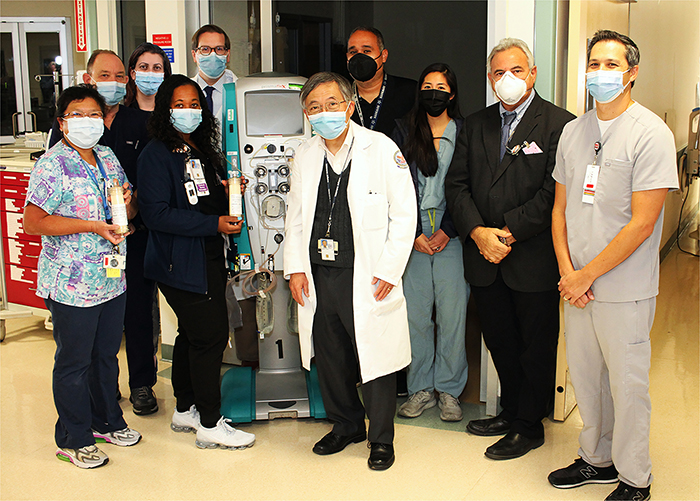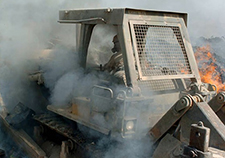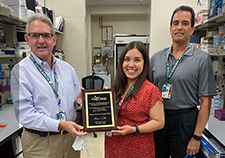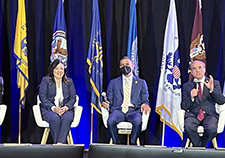Office of Research & Development |
 |


Dr. Michael Lewis and team members at the VA Greater Los Angeles medical intensive care unit (MICU) are shown with the Seraph filter. From left to right: Marlyn L. Lee, RN, Gregory C. Johnson, RN, Mandana Rastegar, MD, Bridget Washington, RN, Michael Lewis, MD, Glenn T Nagami, MD, Jaime Betancourt, MD, Victoria Li, PA, Joseph R Pisegna, MD, and Joseph Moore, RN. Not pictured: Mai Pham, MD, Elham Ghadishah, MD, Ruoxiang Wang, MD, PhD, Joseph Yusin, MD. (Photo by Scott Hathaway, VA Greater Los Angeles Healthcare System.)
October 26, 2021
By Erica Sprey
VA Research Communications
"The Seraph filter shows promise because it is 'pathogen agnostic.' It doesn't matter how many times the virus mutates. We can still filter it out of the blood."
COVID-19 is an urgent health crisis that has demanded the attention of top scientific experts. To date, researchers have developed a handful of new therapies to treat COVID-19 patients. Unfortunately, the sickest individuals often succumb to respiratory failure, organ failure, or death. Worldwide 4.9 million people have died from the disease.
Now, scientists at the Department of Defense, VA, and partner institutions are testing a new technology to treat COVID-19. It’s called the Seraph 100 blood filter. The treatment uses a novel approach to filter out viral particles and harmful molecules from the bloodstream of COVID-19 patients.
Dr. Kevin Chung is principal investigator for the PURIFY OBS clinical trial that will examine the effectiveness of the Seraph filter. He is chair of the department of medicine at the Uniformed Services University in Bethesda, Maryland.

VA Study Documents Health Risks for Burn Pit Exposures

VA center training the next generation of researchers in blood clots and inflammation

AI to Maximize Treatment for Veterans with Head and Neck Cancer

Under Secretary of Health, panel of experts discusses PACT Act impacts for Veterans
"The Seraph filter is different because it targets the pathogen (SARS-CoV-2) to prevent a maladaptive inflammatory response in the body, which itself can cause harm. We think disease severity from COVID-19 correlates with the body's response to the virus. What we are trying to do with Seraph is to remove that trigger," says Chung.
"I liken it to shutting off the faucet, instead of mopping up the floor."
The PURIFY program is a four-part, multi-site clinical evaluation that involves 13 participating sites across the U.S, including one VA medical center. The first stage of PURIFY is a retrospective, observational study that aims to review the safety and effectiveness of the Seraph 100 filter to treat severe COVID-19. Physicians will follow 90 patients with severe COVID-19 who received usual care and treatment with the Seraph filter. The team will compare outcomes in this group with those of an equal number of COVID-19 patients who were treated with usual care alone.
The research team posted preliminary data for the first stage (PURIFY-OBS), in April 2021. They plan to submit the complete data for publication soon. Physicians initially treated 53 COVID-19 patients with the Seraph filter at four ICUs. Severely ill patients who were treated with the Seraph filter experienced a 38% mortality rate, compared with a 67% mortality rate for patients not treated with the new technology. Only one patient treated with the Seraph filter experienced an adverse event—an episode of low blood pressure that responded to medication.
The second stage of PURIFY is a prospective study and will involve 30 patients. Physicians will take blood samples before and after treatment with the Seraph filter to characterize viral load and inflammation markers.
Stage 3 of PURIFY (which has two parts) includes a feasibility study and a randomized clinical trial to determine the effectiveness of the Seraph filter for treating all pathogen-related shock—not just shock caused by COVID-19.
Shock is a serious medical condition where cells in the body do not receive enough oxygen to sustain function. It can result in organ failure and death. There are many conditions that can lead to shock. Examples are traumatic injury, hemorrhage, and infection. Septic shock is most often caused by bacterial infections that set off an exaggerated immune response in the body.
In the case of COVID-19, the sickest patients can experience severe acute respiratory syndrome (SARS), which involves life-threatening lung failure. If a patient is given that diagnosis in COVID-19, that means their likelihood of dying is very high, says Chung.
The Seraph filter received an emergency use authorization (EUA) from the Food and Drug Administration in April 2020. Treatment with the Seraph filter is currently reserved for intensive-care patients with COVID-19 who are in, or close to, respiratory failure. Researchers hope to get full FDA approval for the Seraph filter so that it can be commercialized and made available for broader applications.
* To learn more about how SARS-CoV-2 enters human cells, replicates, and causes COVID-19, view this video.
* To learn more about how physicians are filtering the coronavirus out of the blood, watch a 60 Minutes video segment.
Dr. Michael Lewis is a physician-scientist at the VA Greater Los Angeles Healthcare System. He is the sole VA investigator in the PURIFY trial. Lewis became involved in the DoD-led trial through his interest in COVID-19 research and expertise in transfusion medicine and precision oncology. He reached out directly to Chung and asked to participate in the Seraph trial. Lewis says he received full support from his medical center director, Dr. Steve Braverman, and VA research leadership.
"If vaccines and other therapeutic interventions are not completely effective, then we should continue to explore a variety of modalities to treat COVID-19. Vaccines, antivirals, and anti-inflammatory medications are different components of treating the coronavirus," says Lewis.
Treatment with the Seraph filter is considered "extracorporeal" therapy, meaning it occurs outside the body. The device is an approximately 10-inch-tall cylinder that is filled with microbeads that are coated with heparin sulfate. When a patient's blood passes through the filter, the beads grab any pathogens that are present and remove them from the blood. The cleansed blood is then returned to the body. This process mimics what happens inside a blood vessel and is effective in eliminating toxins, inflammatory products, viruses, and other pathogens.
The filter is attached to a pump system, like a hemodialysis machine, that circulates the patient's blood through the device. However, dialysis—which removes waste products and excess fluid that build up in a patient's body—uses a different technology than the Seraph filter to cleanse a patient's blood.
VA Greater Los Angeles treated its first COVID-19 patient with the Seraph filter over the 2020 Thanksgiving holiday. Lewis and his team published a case study in the Journal of Intensive Care Medicine that outlined care for that patient and one other who was treated with the new device. "I can tell you that lives have been saved because of this technology. The trajectory of the disease was altered," says Lewis.
Patient #1 was a 27-year-old male with obesity who presented to the emergency department with shortness of breath because of COVID-19. He was admitted to the hospital and treated with usual care. On day five, he was transferred to the ICU for impending respiratory failure. After two treatments with the Seraph filter, the patient was weaned off oxygen therapy. On day 11, he was discharged home without supplemental oxygen.
"As a country we need to explore a variety of modalities to deal with any pandemic. I think the Seraph filter is an exciting one that shows potential and promise. It is not theoretical. We have already shown benefit. The study results will relay the power of what we are doing," says Lewis.
Research for the Seraph filter was funded by the Defense Advanced Research Projects Agency (DARPA), Dialysis-like Therapeutic Program, a $150-million program that was charged with finding solutions for critical care medicine in low-resource environments like the battlefield. The program also sought to find solutions for infectious disease threats and sepsis, a life-threatening response to infection.
The agency is responsible for facilitating the development of innovative technologies like the LUKE Arm. Named after Luke Skywalker, the computer-assisted, advanced prosthetic arm can perform simultaneous movements like pinching the fingers together and lifting the arm. VA researchers helped test the new device in Veterans who had experienced traumatic amputations.
"During the COVID-19 pandemic, there's been a tremendous amount of interagency collaboration. That really needs to continue and expand as quickly as possible," says Lewis.
"There is so much within our government that is positive,” he adds. “My one request is that we move as quickly as possible to promote interagency collaboration because in a pandemic, war, or other unforeseen event, we need all government agencies to work together quickly and in unison."
VA Research Currents archives || Sign up for VA Research updates